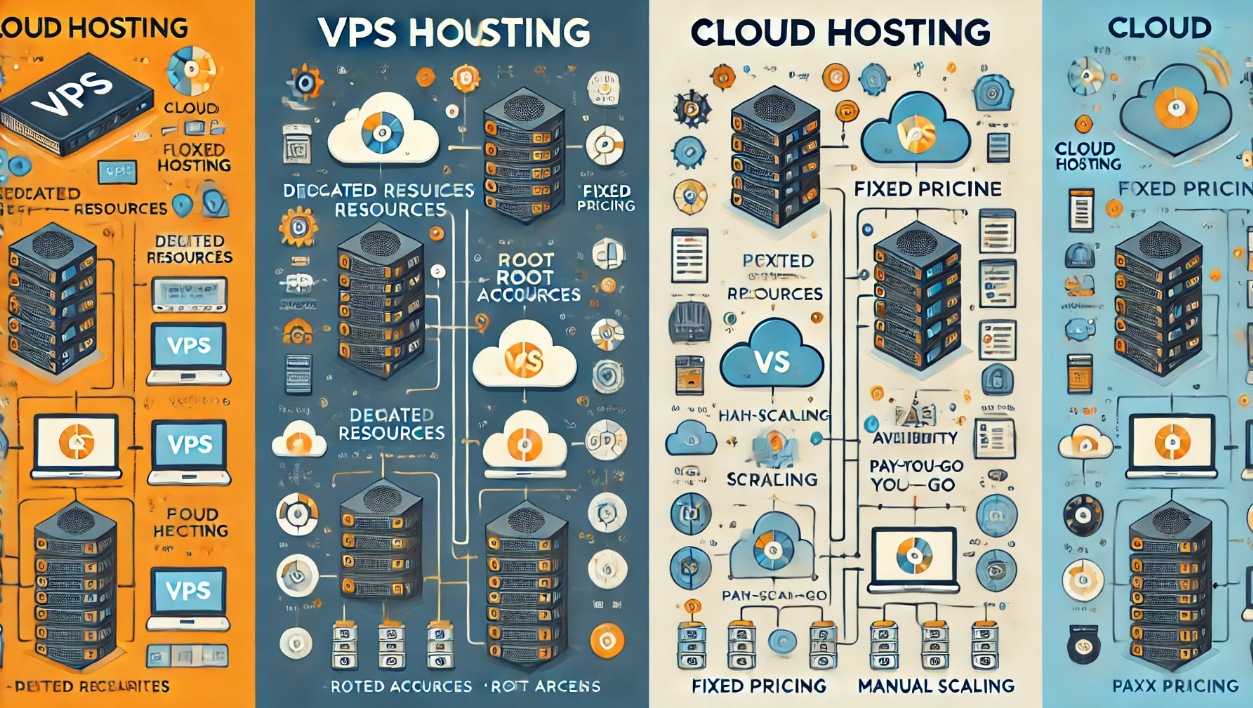VPS Hosting vs. Cloud Hosting: What’s the Difference?
Meta Description: Confused between VPS and cloud hosting? This detailed comparison covers pros, cons, and use cases to help you choose the right hosting solution for your website or application.
Introduction: Choosing the Right Hosting for Your Needs
Whether you’re launching a blog, managing an eCommerce store, or deploying a SaaS platform, one of the first questions you’ll face is:
Should I choose VPS hosting or cloud hosting?
While both offer more power and flexibility than shared hosting, they differ in architecture, scalability, and pricing. Let’s break it down and help you make the right call.
What Is VPS Hosting?
VPS (Virtual Private Server) hosting uses virtualization to split a physical server into multiple isolated environments. Each VPS gets a set amount of CPU, RAM, and storage.
How It Works:
-
One physical server → divided into “mini servers”
-
Each VPS acts independently with its own OS
-
Resources are fixed and allocated to your instance
☁️ What Is Cloud Hosting?
Cloud hosting runs your website or app on a cluster of servers (the “cloud”), not just one. This means your resources are pulled from a network of machines, offering better scalability and redundancy.
How It Works:
-
Your data and apps are stored across multiple servers
-
If one fails, another takes over instantly
-
You can scale resources up or down on-demand
Side-by-Side Comparison: VPS vs. Cloud Hosting
| Feature | VPS Hosting | Cloud Hosting |
|---|---|---|
| Infrastructure | Single physical server | Cluster of virtual servers |
| Scalability | Vertical (manual upgrades) | Horizontal (automatic or instant) |
| Performance | Consistent, dedicated resources | Scalable based on demand |
| Uptime | Depends on physical server | High availability, failover protection |
| Security | Isolated environment | Strong, with shared cloud-layer risks |
| Customization | Full root access | Depends on provider |
| Pricing | Fixed monthly cost | Pay-as-you-go or usage-based billing |
| Best For | Small/medium websites & apps | High-traffic, growing, or mission-critical apps |
✅ Pros and Cons of VPS Hosting
✔️ Pros:
-
Predictable performance and cost
-
Full root access and customization
-
More affordable than cloud for consistent needs
❌ Cons:
-
Limited scalability
-
Hardware failure = downtime (unless backups are in place)
-
Requires manual intervention to upgrade
✅ Pros and Cons of Cloud Hosting
✔️ Pros:
-
Instantly scalable to handle traffic spikes
-
High uptime with built-in redundancy
-
Ideal for DevOps, SaaS, and enterprise-level workloads
❌ Cons:
-
Pricing can be unpredictable
-
May have learning curve for setup
-
Less control in some managed platforms
Who Should Choose VPS Hosting?
-
Developers hosting multiple small-to-medium apps
-
Agencies managing WordPress or CMS websites
-
eCommerce stores with predictable traffic
-
Users who want full control at a fixed cost
Popular VPS providers:
DigitalOcean, Linode, Vultr, Hetzner
Who Should Choose Cloud Hosting?
-
Businesses scaling quickly or globally
-
SaaS companies or apps with fluctuating traffic
-
Projects that require high availability or uptime guarantees
-
Teams using CI/CD pipelines and infrastructure automation
Popular cloud platforms:
AWS, Google Cloud, Microsoft Azure, Scaleway, Kamatera
Real-World Example
Scenario:
A marketing agency runs 20 client websites with consistent traffic.
-
VPS = Better choice due to cost stability and full access per project.
Scenario:
A startup is launching a real-time collaboration tool with user growth expected.
-
Cloud = Better choice for auto-scaling, global CDN, and failover protection.
Final Thoughts: Which One’s Right for You?
| You Should Choose… | If You… |
|---|---|
| VPS Hosting | Need predictability, control, and steady workloads |
| Cloud Hosting | Expect growth, spikes, or need built-in scalability |
If you’re just getting started or want budget-friendly flexibility — VPS is a great entry point.
If you’re building the next big platform or need high performance at scale — cloud is your future-proof path.

